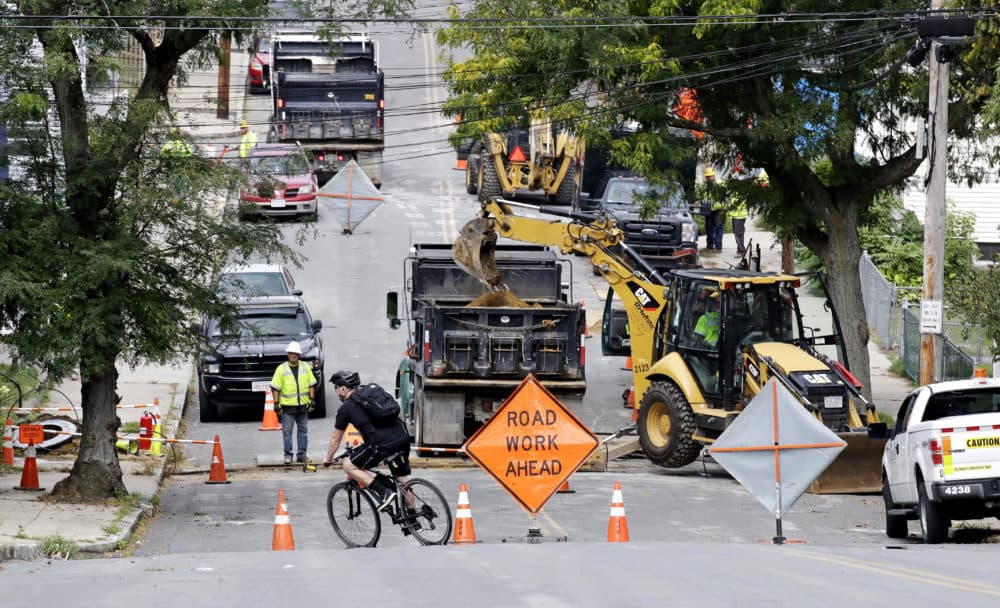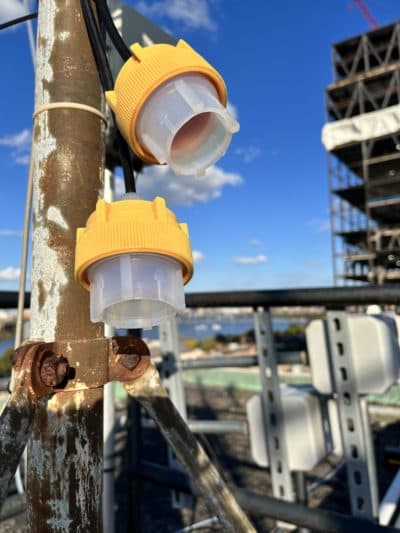Advertisement
Methane emissions in eastern Mass. are 6 times higher than state estimates, study says

A new study finds that emissions of methane — a potent greenhouse gas — from natural gas infrastructure in eastern Massachusetts are about six times higher than state estimates. The study also reports that methane emissions have not decreased over the past eight years, despite state efforts to fix leaks.
The research, published in the journal Proceedings of the National Academy of Sciences (PNAS) on Monday, comes just weeks after a report by the advocacy group Gas Leaks Allies found that the state program to replace leaking gas pipes is likely to cost more than $20 billion over its lifetime, while barely managing to keep up with new leaks emerging each year.
"We may be playing a bit of Whack-A-Mole in the case of pipeline leakage," says methane study co-author Lucy Hutyra, a professor of Earth and Environment at Boston University. "We're certainly fixing leaks, but unfortunately, new leaks are coming in as fast as we're fixing them."
But the study also suggests that pipeline leakage is only part of the problem — "end users" such as household appliances, furnaces and buildings are leaking more natural gas than previously known.
"This data is very sobering. It means that we're effectively undercounting and underestimating the amount of emissions, and this is a real challenge," says Rev. Mariama White-Hammond, Boston's Chief of Environment, Energy, and Open Space. "If we're not clear about the scope of the problem, then we're going to undershoot on the solution."
Methane is the largest component of natural gas, which heats about half the homes in Massachusetts and supplies about 70% of the region's energy needs. The gas leaks undermine the climate benefits achieved when homes and buildings switch from coal and oil heat to natural gas.
"The reason that natural gas is better than coal is that, if you burn it efficiently, you're going to put out less molecules of CO2. But if you leak it, in addition to burning it, you're going to undercut that greenhouse benefit," says lead study author Maryann Sargent, a research scientist at Harvard.
At the rate eastern Mass. is leaking natural gas, says Sargent, "the impact is equivalent to that of coal."
This finding could influence not only how gas leaks are targeted, says Sargent, but also how the state measures progress toward its goal of reaching net zero carbon emissions by 2050.
"Massachusetts, along with a lot of a lot of other states, has set some strong climate goals," Sargent says. "In order to achieve these goals, we need ways to monitor our emissions to see if the policies are actually having their intended impact."

Although carbon dioxide is the most prevalent greenhouse gas in Earth's atmosphere, methane is far better at trapping heat, making it an important target for emissions reduction. According to the Conservation Law Foundation, 28% of Massachusetts' greenhouse gas emissions can be attributed to either leaking or burning natural gas. Methane leaks also kill trees, and can explode in contained spaces.
Gas pipes in Massachusetts are some of the oldest in the country, according to the Gas Leaks Allies report, and many of them have corroded, cracked or splintered. Each year, around 14,000 new gas leaks are detected in the state, posing safety, health and climate risks.
The Massachusetts Department of Environmental Protection (MassDEP) calculates methane emissions from natural-gas infrastructure with a "bottom-up" approach — measuring leakage from a sampling of pipes and at facilities, then averaging that same leak rate across the entire system.
This approach doesn't account for emissions within homes or buildings, and may miss "super-emitters" like some compressor stations.
MassDEP did not respond to requests for comment.

Sargent's team used a different approach, taking air samples from monitors high above the ground, which gave them a direct measurement of methane in the air. To avoid including methane emissions from "natural" sources, like farms or swamps, the researchers only counted methane molecules found in conjunction with another molecule — ethane — also found in natural gas.
Using this approach, Sargent found that about 2.5% of natural gas entering Boston is lost, an estimate comparable to five other U.S. cities examined in the study.
Emissions in Boston were higher in the winter, when consumers used more gas to heat homes and buildings. The finding surprised the researchers, since pipelines — thought to be the dominant source of leaks — are kept at a fairly constant pressure all year, regardless of how much people use. The researchers suspect that the higher winter emissions are due to leaks within homes and buildings.
"About half of the methane that we're seeing in the air that's associated with natural gas is not coming from pipelines. Rather, it's coming from end users," says Hutyra. "Those end users haven't been a policy emphasis for the state. But if half of the gas is coming from those users, it's something we need to pay a lot more attention to."
"We need to be fixing leaks," she adds. "But it's not enough."
